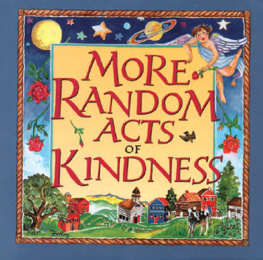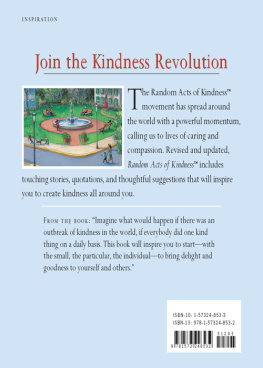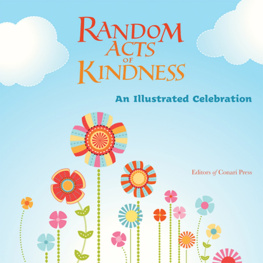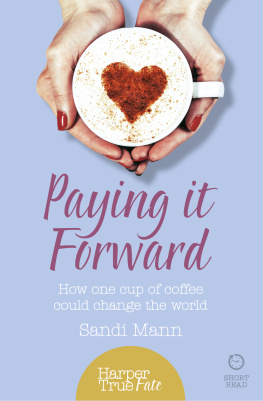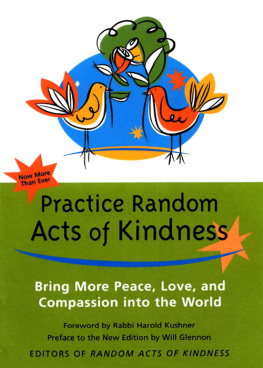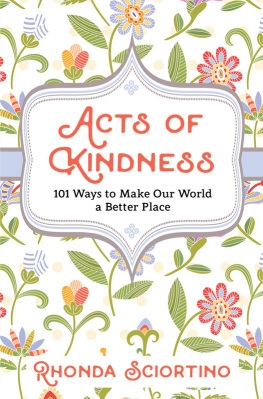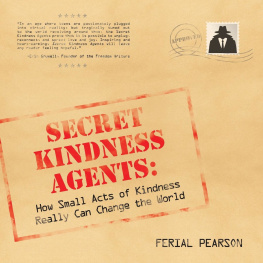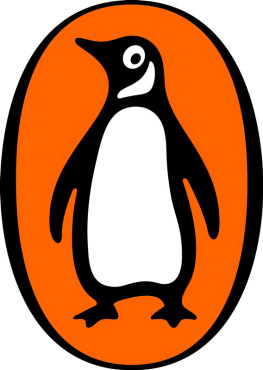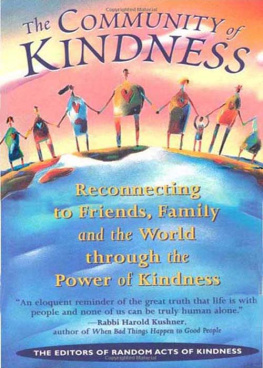Copyright 1994 by The Editors of Conari Press
All Rights Reserved. No part of this book may be used or reproduced in any
manner whatsoever without written permission, except in the case of brief
quotations in critical articles or reviews. For information, contact Conari
Press, 1144 65th St., Suite B, Emeryville, CA 94608.

Printed in the United States of America on recycled paper
Conari Press books are distributed by Publishers Group West
Cover: Sharon Smith Design; illustration: Cynthia Fitting; handlettering: Lily Lee;
interior illustrations: Kathy Warinner
ISBN: 0-943233-82-8
Library of Congress Cataloging-in-Publication Data
More random acts of kindness / the editors of Conari Press.
p. cm.
ISBN 0-943233-82-8 (trade paper) : $8.95
1. KindnessCase studies. 2. KindnessQuotations, maxims, etc.
I. Conari Press
BJ1533.K5M64
1994
177'.7dc20
94-18839
10 9 8 7 6 5 4 3

So many gods, so many creeds,
So many paths that wind and wind,
While just the art of being kind
Is all the sad world needs.
Ella Wheeler Wilcox


More
Random
Acts
of
Kindness

The Editors of Conari Press

Conari Press
Berkeley, CA
The Power
of
Random Acts of Kindness
W e at Conari Press published Random Acts of Kindness to inspire and spread the word about the power of kindness. It did that and more: we have been flooded with letters from readers, telling us of the kindness they have experienced in their livessimple acts that often left profound change in their wake. Each story was precious and powerful, from the simplest gesture to the most unimaginable miracle. More Random Acts of Kindness grew out of the realization that we could not possibly keep these stories to ourselves. Sifting through the piles of letters trying to pick which stories to publish was an almost impossibly difficult task. In the end we simply went on instinct, selecting those that moved us the most and offered the widest reflections on kindness.
Throughout the sorting process we noticed a few things about the inner workings of kindness as stories converged and themes repeated themselves over and over again. One of the obvious (and at first surprising) realizations was that most of the stories submitted, the ones people were almost desperate to tell, were invariably about kindnesses they had received. In each there was a giver and a receiver, but the need to tell the story was almost always from the person who had been the beneficiary.
At first we thought it was simply modesty. At a Random Acts of Kindness party we held, after many people had shared an act of kindness they had received, we pointed out that all the stories were from the point of view of the recipient and asked people to speak as well of the things they had done. The audienee politely listened and then returned to telling the most fascinating and powerful stories of kindnesses done to and for them.
Gradually it became clear that the reason we were flooded with stories from recipients was really quite simple: the quality of the experience was dramatically different. The person on the receiving end experienced what was often a life-altering moment, whereas the giver experienced a less dramatic, quiet affirmation of simply having done the right thing.
The second thing that emerged was that although the stories were as varied as the people telling them, at the foundation of each story was a very simple and compassionate connection between strangers who, for a moment, experienced one another not as strangers, but as family. In a sense, kindness truly is the acting out of our very deep and real connection to everyone and everything around us. It is the realization that all of us are in factnot just in theory or theologyin this together.
The third observation is about the extraordinary impact of even the smallest act of kindness. Many of the experiences happened many years ago but made such an impression that they were every bit as powerful in the retelling. Just a simple story about a single act that occurred twenty years before could and frequently did call forth a deep well of emotion.
Most surprising was the realization of how easily we seem to misplace this jewel. Kindness is something we are accustomed to thinking of as nice or sweet and we tend to set it apart from those things we perceive of as more importantattributes like intelligence, strength, and power. It is so easy to see kindness as a wonderful quality in an individual but of limited importance in the complex life of work, achievement, politics, and society.
That framework arises almost naturally from the structure of our daily lives. We struggle with the immediate responsibilities of paying bills, raising children, and searching for answers to the personal, social, and global problems we face every day. And although kindness is a positive and valued attribute to carry with us in these endeavors, it doesn't always seem to play a role in the end results. It can look like an extra something that good people weave into their daily livesbut not a necessity.
From the vantage point of having read so many people's stories, however, we've come to see that this attitude misses the point entirely. Kindness is not about paying bills and getting by; its sphere of influence is vastly broader and ultimately more important. Kindness is about being who we truly are. Seen from this perspective, kindness emerges as one of the most powerful tools at our disposal as we go through our lives. Its power not only is easily accessible to anyone who cares to use it, but it also can never be diminished; rather it expands with every action. It has the ability to utterly transform another person's life through the simplest of actions. It has the capacity to return us to the very core of our humanity.
Even with this limitless power in our grasp, the texture and context of our lives often leave us confused about how to employ it. The desire is thereto connect, to lend a helping hand, to extend ourselves out into the worldbut the avenues for doing so seem obscure and confused. We are often victims of our own fears and rationalizationsthat the world is too dangerous a place to connect with, that one person cannot make a difference. Too many of us suffer from social shrinkage, reducing the boundaries within which we are willing to act from our hearts to smaller and smaller circles of friends and family.
When a mass tragedy occurs, people respond; floods in the Midwest, hurricanes in Florida, earthquakes in California, famine in Africaall are met with an outpouring of kindness and generosity. Similarly, in most of the stories we received, the response had been triggered through the catalyst of someone else's unavoidable need. And while this is good, think of the untapped potential that would be unleashed if we could find a way to weave the kindness in our hearts into every moment of our lives.
Next page
